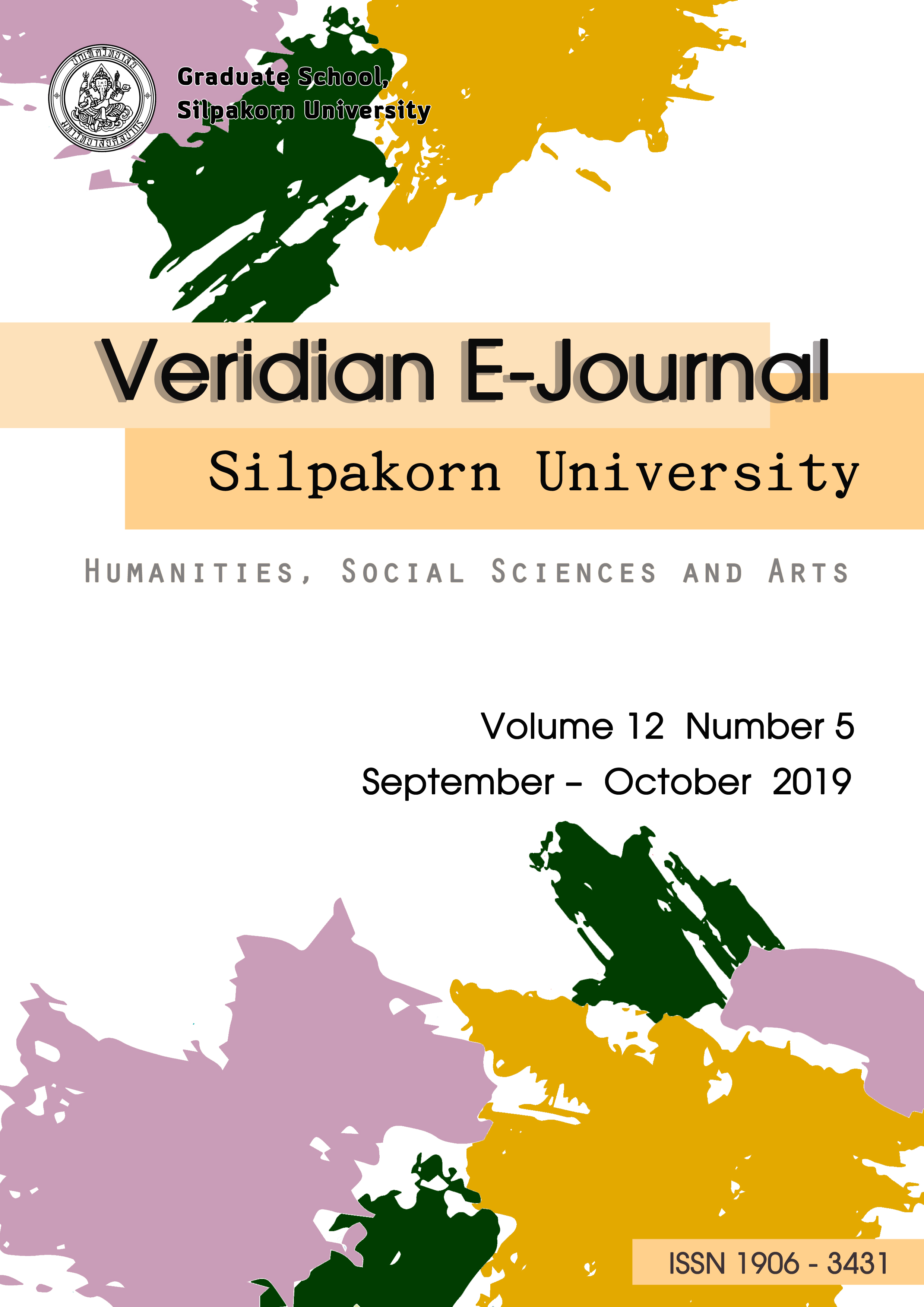ศักยภาพการจัดการห่วงโซ่อุปทานที่เป็นมิตรกับสิ่งแวดล้อมที่มีต่อผลการดำเนินงานของผู้ประกอบการวิสาหกิจชุมชนแปรรูปผลิตผลทางการเกษตรในจังหวัดสกลนคร (Competency Ability Green Supply Chain Management to Affect the Performance of Sakon Nakhon’s Rural Community Enterprises in the Agricultural Sector)
Main Article Content
Abstract
การวิจัยครั้งนี้มีวัตถุประสงค์เพื่อศึกษาศักยภาพการจัดการโซ่อุปทานที่เป็นมิตรกับสิ่งแวดล้อม และศึกษาความสัมพันธ์ของศักยภาพการจัดการห่วงโซ่อุปทานที่เป็นมิตรกับสิ่งแวดล้อมมีต่อผลการดำเนินงานของผู้ประกอบการวิสาหกิจชุมชนแปรรูปผลิตผลทางการเกษตรในจังหวัดสกลนคร กลุ่มตัวอย่างที่ใช้ในการวิจัย ได้แก่ ผู้ประกอบการกลุ่มวิสาหกิจชุมชนกลุ่มแปรรูปผลิตผลทางการเกษตรในจังหวัดสกลนคร จำนวน 205 กลุ่ม เก็บรวบรวมข้อมูลโดยใช้แบบสอบถามเป็นเครื่องมือ และสถิติที่ใช้ในการวิเคราะห์ข้อมูล ได้แก่ ร้อยละ (Percentage) ค่าเฉลี่ย (Mean) ส่วนเบี่ยงเบนมาตรฐาน (Standard Deviation) การวิเคราะห์สหสัมพันธ์ (Correlation Analysis) และการวิเคราะห์ความถดถอย (Regression Analysis)
ผลการวิจัยพบว่า 1) ศักยภาพการจัดการห่วงโซ่อุปทานที่เป็นมิตรกับสิ่งแวดล้อมของผู้ประกอบการวิสาหกิจชุมชนแปรรูปผลิตผลทางการเกษตรในจังหวัดสกลนคร โดยรวมและรายด้านในระดับมาก ได้แก่ ด้านการจัดซื้อจัดหาที่เป็นมิตรกับสิ่งแวดล้อม ด้านการดำเนินงาน/การผลิตที่เป็นมิตรกับสิ่งแวดล้อม ด้านการบริหารสินค้าคงคลังที่เป็นมิตรกับสิ่งแวดล้อม และด้านการกระจายสินค้าที่เป็นมิตรกับสิ่งแวดล้อม 2) ผลการดำเนินของผู้ประกอบการวิสาหกิจชุมชนแปรรูปผลิตผลทางการเกษตรในจังหวัดสกลนครอยู่ในระดับมากทุกข้อ ได้แก่ กิจการมีรายได้เพิ่มขึ้นอย่างต่อเนื่อง กิจการมีต้นทุนในการดำเนินงานต่ำลง กิจการมีผลกำไรเพิ่มขึ้นอย่างต่อเนื่อง และกิจการมียอดจำหน่ายสินค้าที่เพิ่มขึ้นอย่างต่อเนื่อง 3) ความสัมพันธ์ของศักยภาพการจัดการห่วงโซ่อุปทานที่เป็นมิตรกับสิ่งแวดล้อมกับผลการดำเนินงานของผู้ประกอบการวิสาหกิจชุมชนแปรรูปผลิตผลทางการเกษตรในจังหวัดสกลนคร พบว่า ศักยภาพการจัดการห่วงโซ่อุปทานที่เป็นมิตรกับสิ่งแวดล้อมมีความสัมพันธ์ต่อกันกับ ผลการดำเนินงาน และสามารถทำนายผลการดำเนินงานได้ ดังนั้น ผู้ประกอบการจำเป็นต้องมีการปรับตัวด้านการจัดการโซ่อุปทานที่เป็นมิตรกับสิ่งแวดล้อม รวมทั้งการเพิ่มขีดความสามารถในการบริหารจัดการเพื่อให้สอดคล้องกับการเปลี่ยนแปลงของสภาพแวดล้อมและความต้องการของผู้บริโภค ส่งเสริมให้เกิดเครือข่ายการผลิตและบริการ เพื่อให้องค์การบรรลุผลสำเร็จตามเป้าหมายและสามารถแข่งขันได้อย่างยั่งยืนต่อไป
The purposes of this research were to study the Competency ability of Green Supply Chain management. And to study the correlation of the competency ability of the Green Supply Chain management to the performance of Sakon Nakhon’s rural community enterprises in the agricultural sector. The sample group of this research consisted of 205 rural community enterprises in the agricultural sector in Sakon Nakhon province. The data were collected by the questionnaires. The statistics used for data analysis were percentage, mean score, Standard Deviation, correlation analysis and regression analysis.
The results of this study revealed that; 1)The Potential of Green Supply Chain Management of Sakon Nakhon’s rural community enterprises in the agricultural sector was at a high level, in all cases, Green Procurement, Green Manufacturing, Green Warehousing and Green Distribution. 2)The performance of Sakon Nakhon’s rural community enterprises in the agricultural sector was at a high level, in all cases, the company had a continuous increase in revenue, the business had a lower operating cost, the business increased continuously. And the business has continued to sell products. 3)The correlation between the potential of Green Supply Chain Management and performance of Sakon Nakhon’s rural community enterprises in the agricultural sector proves that the potential of Green Supply Chain Management is correlated with performance and predictability. So that, the entrepreneurs need to adapt to green supply chain management. Including the increase in management capabilities to comply with environmental changes and the needs of consumers. To encourage production networks and services to achieve their goals and competitive sustainability.

